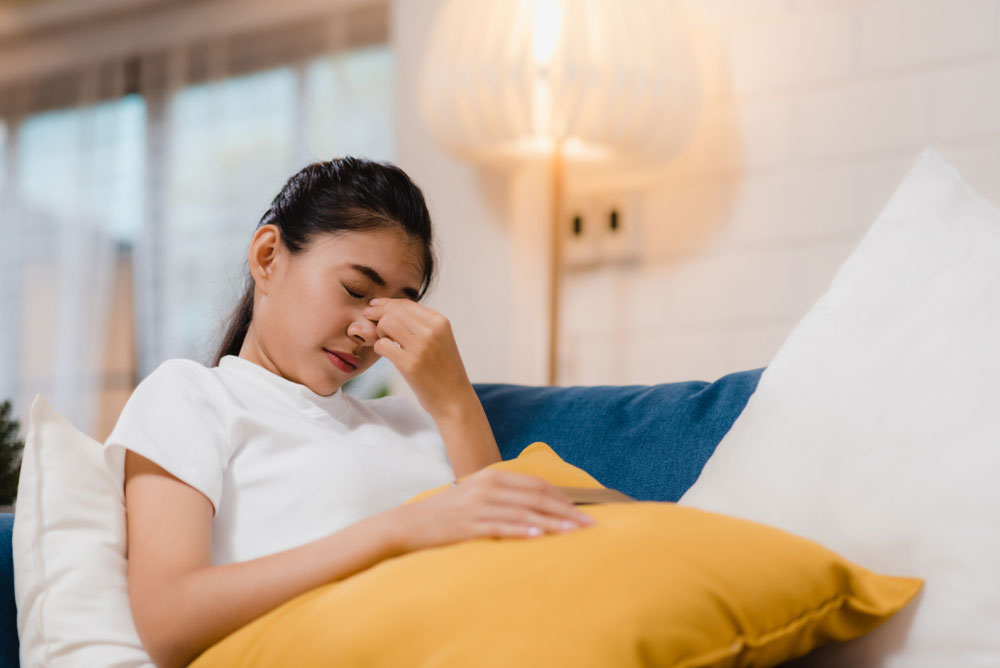
Our eyes are extremely sensitive and can be affected by many things. There is also a range of problems that we can experience with our eyes. Dryness and itchiness are two of the most common complaints of patients who visit their eye doctor due to developing unpleasant symptoms associated with their eyes.
In order to treat your eyes effectively, your eye doctor will want to get to the bottom of what is causing them to feel this way. Typically, there are just a couple of different reasons why someone may experience dry, itchy eyes. Here’s what you need to know about the primary causes of itchy, dry eyes, and what treatment can help alleviate your symptoms.
Eye Allergies
By far the most common cause of these symptoms is some type of allergy. Allergies can affect various parts of our body and body systems, including our eyes. Eye allergies are an autoimmune response that occurs when our eyes come into contact with a substance that our body views as a harmful invader. These invaders are known as allergens and can include substances including pollen, smoke or dust. When our eyes detect their presence, our immune systems react by producing chemicals that fight against the allergen, despite it being harmless. It is this reaction that produces the symptoms associated with eye allergies.
Symptoms of eye allergies
In addition to itchiness and dryness, there are a number of other symptoms associated with eye allergies. These include:
Redness
Burning, stinging eyes
Scaling around the eyes
Swollen or puffy eyelids, particularly first thing in the morning
Excessive watering of the eyes
Eye allergies can affect one or both eyes, and they may also be accompanied by additional symptoms including sneezing, a runny nose, or nasal congestion.
Treatment for eye allergies
There are numerous different options available for treating eye allergies, though it may be a case of trial and error to establish which is most effective for you. Some of the treatments that your eye doctor may recommend could include:
Eye drops. Usually the first type of treatment, these eye drops can contain medications that relieve the symptoms associated with allergic reactions, including inflammation and soreness. Some eye drops are lubricating. You may hear them referred to as ‘artificial tears’ since they replicate natural tear film and reduce any dryness. They also help to wash allergens out of your eyes.
Medications. There are a number of oral medications that are effective at counteracting immune response in order to reduce the symptoms associated with an eye allergy. These include:
Antihistamines
Decongestants
Steroids
Your eye doctor may prescribe these instead of, or alongside, eyedrops to help you achieve relief from your dry, itchy eyes.
Immunotherapy. Immunotherapy refers to treatment that is designed to modify your body’s responses to allergens that you come into contact with so that they are not so severe. Also known as allergy shots, they are usually only recommended in severe cases where other treatments haven’t proved to be effective. Most immunotherapy is administered in the form of a series of injections. These injections contain small amounts of the allergen which are increased over time.
Dry Eye
Many people are unaware that there is actually an ocular condition that does by the name ‘dry eye’. It is also sometimes referred to as dry eye syndrome, disorder, or disease. However, they all refer to the same condition which is characterized predominantly by the symptom that reflects the name – dry eyes.
The dry eye normally occurs for one of three different reasons.
The eyes do not produce enough natural tear film to keep them healthy.
The tear film drains from the eye too quickly, causing them to become dry.
There isn’t enough oil in the tear film for it to be effective.
Symptoms of Dry Eye
In addition to experiencing eyes that feel dry, there are several other symptoms of the condition. These include:
Itchiness and irritation
Stringy mucus in and around the eyes
Redness
Sensitivity to light
Blurred vision
Excessive watering, which is the body’s response to a lack of moisture
Symptoms usually affect both eyes at the same time, although not necessarily to the same extend.
Treatment for dry eyes
Fortunately, there are a number of different treatments available for dry eyes. Again, it may be that you need to try a variety of options to find the one that is most effective at alleviating your symptoms.
Eye drops. Unsurprisingly, eye drops – and particularly artificial tears – are one of the simplest and most effective treatments for dry eyes since they work by replacing natural tear film. In addition to this, there are also prescription eye drops available that help to reduce inflammation that may be exacerbating the condition.
Oral medications. There are some drugs that can be beneficial in eliminating the effects of dry eye. These include those which are designed to reduce eyelid inflammation, those which focus on controlling corneal inflammation and those that stimulate natural tear film production.
Lipiflow. Lipiflow is a technological solution for dry eyes that combines warmth and gentle massage therapy to unclog the glands responsible for tear film production. The process takes just a few minutes per eye and doesn’t hurt although it may feel a little strange.
Plugs. Plugs are tiny inserts that are placed inside the drainage channels of the eyes to prevent tear film from draining too quickly. These can be temporary or permanent and aren’t able to be seen or felt once they are in place.
If you have dry, itchy eyes, please get in touch with our experienced eye care specialists in Chesapeake, VA who will be happy to help you find the solution to your discomfort.








